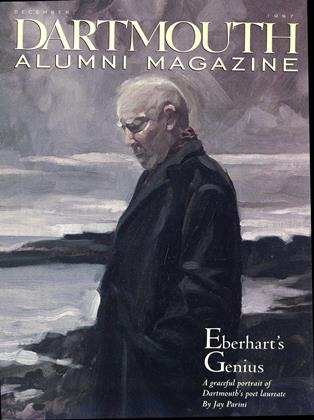He's a '54—and Noir
Bob Rafelson dropped out of lie class of 1-954—having fallen under the thrall of Warner Bentley and having won an Eleanor Frost one-act play award. He would go on to become a famous and controversial movie director, often associated with actor Jack Nicholson. Last spring he came back to campus to receive another award, this time from the Dartmouth Film Society.
That youthful one-acter was about a family confrontation, a theme Rafelson has explored frequently, most recently in Blood and Wine, screened at the Film Society: presentation.
But being part of the Dartmouth family isn't confrontational for Rafelson. He has, for example, remained a good friend of screenwriter/actor/director Buck Henry'52 since they met on campus almost a half-century ago. It was at the traditional gauntlet- running event-on the Green, where freshman Rafelson declined to be more than an observer, like junior Henry. The 6'4' Rafelson hoisted the slight Henry on his shoulders for a better view. A more recent example: Rafelson befriended tyro director Julie Davis '90 and helped her finish her recent and well-regarded film I LoveYou,: Don't Touch Me. He gave her the short ends from Blood and Wine—Hollywood slang for the raw film left in the can that's insufficient for major productions to bother with.
Early in his Hollywood years Rafelson co-wrote and co-produced such breakthrough films as Easy Rider and Five Easy Pieces. Noir became a word frequently used to describe his body of work. Rafelson himself has hitchhiked across the South, gathering stories and feelings and atmosphere—the stuff of "smaller" films.
He's pessimistic about the future of the independents—despite this year's near shutout of the big studios at Oscar time. "Big studios wear you down and dissipate your energy. Indies are harder to make now, and working with studios is degrading. The market wants big entertainment. Better to make one $200-million grosser than ten $20-million grossers. The investment may be bigger, but the energy expended is far less."
Nevertheless, creative people like Rafelson continue to fight the system—even if it's just giving short ends to a newcomer.
Rafelson, gathering the stuff of"smaller" films.
 View Full Issue
View Full Issue
More From This Issue
-
 Feature
FeatureEarly X-rays, Missing Skulls and Frozen Pizza
December 1997 -
 Cover Story
Cover StoryThe Full Mind of Richard Eberhart
December 1997 By Jay Parini -
 Feature
FeatureNathan's Body Shop
December 1997 -
 Feature
FeatureCathedral in THE PINES
December 1997 By Castle Freeman Jr. -
 Feature
FeatureA Musical Post-Mortem
December 1997 -
 Feature
FeatureAn Uulikely Medical School
December 1997







